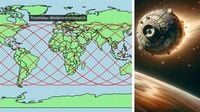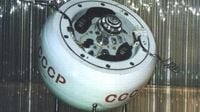A Soviet Venus probe launched in 1972 is expected to crash on Earth on May 10, 2025, without reaching its destination. The European Space Agency (ESA) has reported that the probe capsule has a diameter of about one meter and weighs nearly 500 kilograms. The exact location of the impact of the 'Kosmos-482' probe cannot be predicted precisely until shortly beforehand, but the risk of anyone being harmed by the impact is considered very low.
According to ESA, the capsule is made of extremely durable material and is likely to arrive on Earth intact, as it was designed to withstand entry into Venus's atmosphere. The Soviet Union sent several probes to Venus between 1961 and 1983 as part of the 'Verena' program, with many of these probes successfully landing and sending information back to Earth. 'Kosmos 482' was launched on March 31, 1972, with the intention of performing a controlled landing on Venus. However, due to a failure of the carrier rocket, the entry capsule remained in Earth's orbit, and while other components disintegrated long ago, the capsule has been on an eccentric orbit around the Earth since then.
As of May 10, 2025, the latest calculations indicate that the re-entry of 'Kosmos 482' is imminent, expected around 8:39 AM Central European Time (CET). Astronomer Jonathan McDowell had previously predicted the crash would occur by 8:30 AM CET. The ESA recalculated the crash time and announced that the re-entry could occur at 8:37 AM CET, with an uncertainty of +/- 3.28 hours. This means that the window for potential impact stretches from 3 AM to 10 AM CET, with the probe expected to make multiple orbits around the Earth during this time.
On May 9, 2025, an updated prediction from ESA indicated that 'Kosmos 482' would crash at approximately 8:26 AM CET, with an uncertainty of +/- 4.35 hours. The probe's trajectory suggests that it will enter the Earth's atmosphere between 52 degrees north and 52 degrees south latitude, meaning that regions across Africa, South America, Australia, and parts of Europe, including Germany, could be affected.
In Germany, the southern part, particularly Brandenburg, lies within this potential impact zone. Experts have warned that the crash could affect Germany, as the ESA has indicated that the probe will orbit the Earth several times before its descent. However, the probability of the probe hitting a populated area is considered very low. The Bundeswehr's space situation center has stated that they do not expect the probe to land on German soil, but they cannot completely rule it out.
Dr. Marco Langbroek, a Dutch scientist, has predicted that the probe is more likely to crash into the ocean. He emphasized that while there is a risk involved, it is comparable to that of a random meteorite impact, which occurs several times a year. The ESA has reported that the risk of injury from space debris is extremely low, with the annual chance of a person being harmed by such debris being less than 1 in 100 billion.
The 'Kosmos 482' probe, which has been orbiting the Earth for nearly 53 years, is returning to Earth uncontrollably. Many parts of the probe have already disintegrated in the Earth's atmosphere over the decades, but the remaining 500-kilogram lander module is expected to crash down. This lander module was initially intended to send data back from Venus but has instead remained in orbit due to the rocket failure.
Experts have noted that the capsule is robustly constructed, designed to withstand the extreme conditions of Venus's atmosphere. The ESA reports that it can survive up to 300 g of acceleration and 100 atmospheres of pressure, which increases the likelihood that it will survive re-entry intact. However, there is uncertainty regarding the functionality of its parachute system, which may have been deployed after so many years in orbit.
As the crash date approaches, the ESA and other space agencies are closely monitoring the situation. They have advised the public to remain calm, as the chances of the probe causing harm are minimal. The excitement surrounding the event has captured the attention of astronomers and space enthusiasts, who are eager to witness the spectacle of a historical space probe's return to Earth.
In summary, 'Kosmos 482' is expected to crash on May 10, 2025, with a wide potential impact area spanning from 52 degrees north to 52 degrees south latitude. While parts of Germany, including Brandenburg, lie within this zone, experts maintain that the likelihood of injury is extremely low. As the world watches, the return of this Soviet-era probe serves as a reminder of the challenges and unpredictability of space exploration.






